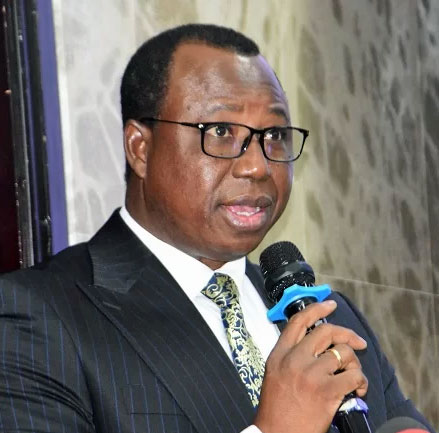
Joseph Whittal, commissioner of Ghana’s Commission on Human Rights and Administrative Justice. (Photo courtesy of CHRAJ)
Ghana human rights Commissioner Joseph Whittal encourages LGBTQ Ghanaians not to flee the country, despite the possibility that Parliament’s harsh anti-LGBTQ+ bill might survive a review by the Supreme Court and be signed by President Nana Akufo-Addo.
In an interview with the BBC, Whittal said that the anti-LGBTQ bill “seems to overreach” and, as the commission told Parliament before the bill was passed, that it encroaches on the constitutional right to association — “a fundamental human right”.
“Any attempt to have a bill that attempts to take away the right of any group of persons in Ghana from associating, as this bill attempts to do, is a constitutional overreach,” he said.
He predicted that, when the Supreme Court rules on the anti-LGBTQ bill, it will do its duty under the constitution by defending human rights from being violated by the proposed law.
He advised members of the LGBTQ community to wait for the court’s judgment, trusting that it will protect their constitutional rights.

Last week, anti-LGBTQ protesters in Accra, Ghana, demanded a ruling from the Ghana Supreme Court on the anti-LGBTQ bill that Parliament passed in February. (Photo courtesy of X/Twitter)
Supporters of the anti-LGBTQ bill are pushing for the Supreme Court to rule on the bill, because President Akufo-Addo has said he won’t act on anti-LGBTQ bill until the Supreme Court makes a ruling.
But the court said last month that it cannot act until it receives filings from all the interested parties.
Last week, anti-LGBTQ groups led by MP Sam George protested in Accra against Chief Justice Gertrude Torkornoo over delays in the Supreme Court’s handling of the Anti-LGBTQ Bill, the LGBTQ+ rights organization Rightify Ghana stated on X/Twitter. Despite prior explanations from the Judiciary Service of Ghana, protesters issued threats, prompting the Association of Magistrates and Judges (AMJG) to condemn their conduct and verbal attacks, Rightify Ghana said.
If enacted, the anti-LGBTQ bill would expand on Ghana’s current law that provides a three-year prison sentence for same-sex intimacy. The new bill would add the same punishment for people who:
- Identify as (“hold out as”) LGBTQ;
- Participate in gender-reassignment surgery; or
- Enter into a same-sex marriage or attend a same-sex wedding.
It would also impose prison sentences of up to 10 years on people who “promote” LGBTQ activity.
Whittal reiterated that Ghana is a democratic nation that protects human rights.
He said that the Commission on Human Rights and Administrative Justice is “commissioned to protect the rights of all persons in Ghana.” The commission is concerned about the bill’s “sweeping nature”, he said.
Rightify Ghana published this account of the Whittal interview:
CHRAJ Commissioner Criticises Anti-LGBTQ Bill as Constitutional Overreach, Urges Supreme Court Review to Protect Human Rights
Whittal encouraged LGBTQI+ Ghanaians not to flee the country, reassuring them that Ghana is a democratic nation with a rule of law that protects fundamental human rights. He advised them to wait for the court’s judgment, trusting that it will respect their constitutional rights
Mr Joseph Whittal, Commissioner of the Commission on Human Rights and Administrative Justice, described the anti-LGBTQ Bill as “far-reaching” in an interview with the BBC, raising concerns about its potential constitutional violations. He pointed out that the Ghanaian constitution does not explicitly mention sexual orientation, but this does not mean LGBTQ+ persons lack rights. Whittal argued that the bill is a “constitutional overreach” as it threatens fundamental human rights, including the right to association.
He expressed concerns about the impact of the bill on CHRAJ’s mandate to educate and protect human rights, saying, “Our promotion or public education on the rights of vulnerable persons, including LGBTQ, would make us potentially in violation of that Bill; and that will be unconstitutional because the bill cannot come and take away the functions of this Commission.”
Whittal also questioned how institutions like the National Commission on Civic Education (NCCE) and the Ghana AIDS Commission would navigate the bill’s provisions, suggesting that their duties could be seen as violating the bill. He warned that even the media could face trial for providing a platform that is perceived to promote LGBTQ issues.
He urged a measured approach, supporting the bill’s referral to the Supreme Court for thorough interpretation, stating, “I want to believe that they would have made sure that there is sanity and all the constitutional provisions which may stand affected would have been taken care of.”
Whittal encouraged LGBTQI+ Ghanaians not to flee the country, reassuring them that Ghana is a democratic nation with a rule of law that protects fundamental human rights. He advised them to wait for the court’s judgment, trusting that it will respect their constitutional rights.
Source: African Human Rights Media Network member Erasing 76 Crimes.
COMMENTS